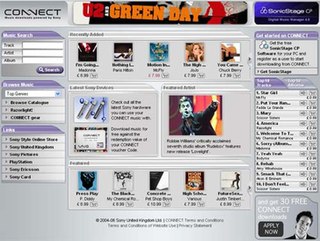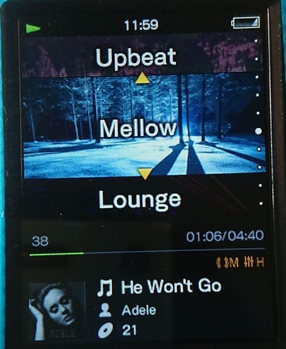

The Walkman ZX Series is a line of premium high-end digital audio players designed and developed by Sony since 2013. It sits above the A Series and below the luxury WM1 Series in the Walkman range.


The Walkman ZX Series is a line of premium high-end digital audio players designed and developed by Sony since 2013. It sits above the A Series and below the luxury WM1 Series in the Walkman range.

The first model, NW-ZX1, featured a 4-inch display and a high quality digital amplifier that sold for about $900. It runs on Android. [1] It was introduced on September 25, 2013, alongside the NW-F880 series and first released in Japan on December 7, followed by overseas markets in 2014. [2] [3]
A second generation player, the NW-ZX2, was released in 2015. [4]
Later in the same year, the NW-ZX100 was introduced. This player is cheaper than the ZX2, has a more compact and slimmer body, and runs on custom Sony software. [5]
In 2017 the NW-ZX300 replaced the NW-ZX100. It is slimmer than the ZX100 and borrows design cues from the A Series of the same time. [6] It also includes a 4.4 mm Pentaconn connector. [7]
The NW-ZX500 series was introduced at IFA 2019, retailing for €830/£750, with native DSD and MQA playback. [8] It also had a USB-C port replacing the proprietary WM-PORT for data and power connection. [9]
The NW-ZX700 series was introduced in January 2023. [10] It has been released in select Asia-Pacific countries in January such as India, [11] and will be released in Japan on February 23 for ¥104,500. [12]
What Hi-Fi? reviewed the NW-ZX1, praising the sound, design and buttons, while criticising its price and non-expandable memory. [13] PC World Australia gave the player 3.5 stars out of 5, giving merit to sound quality and battery life, but noting that the buying price is steep. [14]
In What Hi-Fi?'s early review of the NW-ZX507, its "detailed and dynamic sound" was praised, with no negatives given. [15]
| Series | Image | Model | Capacity | Release Date | Display | Rated battery life | Audio formats | OS | Wireless connectivity | Terminals | Physical size | Weight |
|---|---|---|---|---|---|---|---|---|---|---|---|---|
| NWZ-ZX1 | NWZ-ZX1 | 128 GB | December 2013 | 4" (10.2 cm) 854 x 480 (FWVGA) | 16 hours (Hi-Res Audio), 32 hours (MP3) | MP3, WMA, ATRAC (Japanese market), ATRAC Advanced Lossless (Japanese market), WAV, AAC, HE-AAC, FLAC, Apple Lossless, AIFF, DSD [16] [17] [18] | Android 4.1 | IEEE 802.11 a/b/g/n, Bluetooth 3.0 | 3.5 mm stereo jack, WM-PORT | 122 mm 60 mm 13 mm | 139 g (4.9 oz) | |
| NW-ZX2 | NW-ZX2 | February 2015 | 33 hours (Hi-Res Audio), 60 hours (MP3) | Android 4.2 | 3.5 mm stereo jack, WM-PORT, Micro SD | 131 mm 65 mm 18 mm | 235 g (8.29 oz) | |||||
| NW-ZX100 | NW-ZX100 | October 2015 | 3" (7.6 cm) 400x240 (WQVGA) | 45 hours (Hi-Res Audio), 70 hours (MP3) | Original | Bluetooth 3.0 | 3.5 mm stereo jack, WM-PORT, Micro SD | 120 mm 54 mm 15 mm | 145 g (5.11 oz) | |||
| NW-ZX100HN | ||||||||||||
| NW-ZX300 |  | NW-ZX300A | 16 GB | October 2017 | 3.1" (7.8 cm) 800 x 480 (WVGA) | 26 hours (Hi-Res Audio), 30 hours (MP3) | MP3, WMA, ATRAC (Japanese market), ATRAC Advanced Lossless (Japanese market), WAV, AAC, HE-AAC, FLAC, Apple Lossless, AIFF, DSD, APE, MQA [19] [20] | Bluetooth 4.2 | 3.5 mm stereo jack, 4.4 mm balanced jack, WM-PORT, Micro SD | 120.4 mm 57.7 mm 14.9 mm | 157 g (5.54 oz) | |
| NW-ZX300 | 64 GB | |||||||||||
| NW-ZX300G | 128 GB | |||||||||||
| NW-ZX500 |  | NW-ZX505 | 16 GB | November 2019 | 3.6" (9.1 cm) 1280 x 720 (HD) | 16 hours (Hi-Res Audio), 20 hours (MP3) | MP3, WMA, WAV, AAC, HE-AAC, FLAC, Apple Lossless, AIFF, DSD, APE, MQA [19] [20] | Android 9 | IEEE 802.11 a/b/g/n/ac, Bluetooth 5.0 | 3.5 mm stereo jack, 4.4 mm balanced jack, USB-C, Micro SD | 122.6 mm 57.9 mm 14.8 mm | 164 g (5.78 oz) |
| NW-ZX507 | 64 GB | |||||||||||
| NW-ZX700 | NW-ZX706 | 32 GB | January 2023 [21] | 5" 1280 x 720 (HD) | 21-25 hours | Android 12 | 3.5 mm stereo jack, 4.4 mm balanced jack | |||||
| NW-ZX707 | 64 GB |

Walkman, stylised as WALKMAN (ウォークマン), is a brand of portable audio players manufactured and marketed by Japanese technology company Sony since 1979. The original Walkman was a portable cassette player and its popularity made "walkman" an unofficial term for personal stereos of any producer or brand. By 2010, when production stopped, Sony had built about 200 million cassette-based Walkmans.

MiniDisc (MD) is an erasable magneto-optical disc-based data storage format offering a capacity of 60, 74, and later, 80 minutes of digitized audio.

Hi-MD is a magneto-optical disc-based data storage format. It was a further development of the MiniDisc. With its release in later 2004, came the ability to use newly developed, high-capacity 1 gigabyte Hi-MD discs, in the same dimensions as MiniDisc. The last recorder and player was discontinued in 2011. Blank discs stopped production in September 2012.

Sony Connect, stylised Sony CONNECT, was the name for a series of related software products by Sony, most notably the Connect Music Store online music store. Sony CONNECT Inc. was a subsidiary of Sony Corporation of America.

A portable media player (PMP) is a portable consumer electronics device capable of storing and playing digital media such as audio, images, and video files. The data is typically stored on a compact disc (CD), Digital Video Disc (DVD), Blu-ray Disc (BD), flash memory, microdrive, or hard drive; most earlier PMPs used physical media, but modern players mostly use flash memory. In contrast, analogue portable audio players play music from non-digital media that use analogue media, such as cassette tapes or vinyl records.

Discman was Sony's brand name for portable CD players. The first Discman, the Sony D-50 or D-5, was launched in 1984. The brand name changed to CD Walkman, initially for Japanese lineups launched between October 1997 and March 1998, and then entirely in 2000. Discman and CD Walkman players are no longer produced.
Gapless playback is the uninterrupted playback of consecutive audio tracks, such that relative time distances in the original audio source are preserved over track boundaries on playback. For this to be useful, other artifacts at track boundaries should not be severed either. Gapless playback is common with compact discs, gramophone records, or tapes, but is not always available with other formats that employ compressed digital audio. The absence of gapless playback is a source of annoyance to listeners of music where tracks are meant to segue into each other, such as some classical music, progressive rock, concept albums, electronic music, and live recordings with audience noise between tracks.

SonicStage is a discontinued software product from Sony that is used for managing portable devices when they are plugged into a computer running Microsoft Windows. It comprises a music player and library manager, similar to iTunes, Windows Media Player and RealPlayer. It is used to manage the library of ATRAC and MP3 recordings on a PC.

The Sony Reader was a line of e-book readers manufactured by Sony, who produced the first commercial E Ink e-reader with the Sony Librie in 2004. It used an electronic paper display developed by E Ink Corporation, was viewable in direct sunlight, required no power to maintain a static image, and was usable in portrait or landscape orientation.
The following comparison of portable media players compares general and technical information for notable digital playback devices.
The Walkman A810 series is a portable media player designed by Sony. It was a flagship model in the Walkman digital player family. The model debuted in Asia in 2007, and then became available in North America. This series updates the previous Walkman A800 of the Walkman A Series, with the same hardware but different on-PC music management program.

SensMe is a proprietary music mood and tempo detection system created by Sony Corporation, and employed in numerous Sony branded products, including in some Walkman digital music players, the Media Go application, the PlayStation Portable, and Sony Ericsson and Sony Xperia handsets. It is named Omakase Channel (おまかせチャンネルを使う) in Japan.

The Walkman X series is a portable music player designed and released by Sony in Japan in 2009. It was marketed as a high-end, internet-enabled model in the Walkman digital player family in 2009. The model debuted in Japan in April 2009, and then became available in North America, Europe, China and also other regions. The Walkman X series was the first Walkman device to feature a touch screen and S-Master digital amplifier technologies.

The Sony Walkman Z series is a discontinued Android 2.3-based portable media player manufactured as a part of Sony's Walkman line of music players. First announced in Japan on September 13, 2011, and going on sale the following December, it was announced for an American release by mid-2012 at the 2012 Consumer Electronics Show. It was the first Walkman that ran on the Android operating system.
The Walkman S Series is a line of portable media players designed and developed by Sony, currently marketed in Japan. The S Series made their debut in the fall of 2006 and later were launched in other regions. Although the first generation of models had generic displays, all next generations of players of the S Series had TFT color displays and supported video playback. They were slightly cheaper than the flagship A Series but had more features than the E Series. The S Series was discontinued outside Japan in 2012 and continues solely in the domestic market.
The Walkman A Series is a flagship line of mid-range digital audio players (DAP) by Sony as part of its Walkman range. The A Series has been marketed since 2005, initially as the top spec Walkman players and since 2014 as a mid-range following the introduction of the ZX Series. The "A" originally stood for "All in one, Advanced, and Attractive".

The Walkman F series is a discontinued portable media player manufactured as a part of Sony's Walkman line of music players, through two generations. They are high-res compatible players and run the Android operating system.
The Walkman E Series is a line of digital audio (DAP) and portable media (PMP) players, marketed by Sony as part of its Walkman range. E Series devices have been marketed since 2000, although in its current form since 2008 as entry-level, candybar styled players.